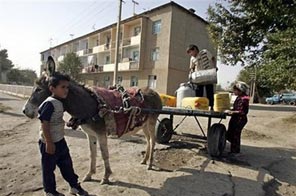Tajikistan to vote in parliamentary election
DUSHANBE: Tajikistan, an impoverished nation in Central Asia that borders Afghanistan, votes for a new parliament Sunday as the country struggles to revive its economy and protect its borders from al-Qaida militants.
Western governments are keeping a close eye on Tajikistan, concerned that poverty and economic instability could lead to unrest. They are hoping development projects will be implemented to prevent Afghanistan's chaos from spreading across the porous 830-mile (1,300-kilometer) border.
The elections pit Communists and the only legally registered Islamic political movement in ex-Soviet Central Asia against a monolithic government-backed party.
The vote will almost surely strengthen President Emomali Rakhmon's nearly two-decade grip on power. Rakhmon, in office since 1992, runs Tajikistan with a heavy hand and the government is frequently criticized abroad for human rights violations and media and opposition suppression. He was elected to another seven-year term in 2006.
In recent months, Tajikistan has reported clashes between government troops and militants allied with the Taliban in areas near the Afghan border.
Richard Holbrooke, the U.S. envoy for Afghanistan and Pakistan, visited Tajikistan last week to hail the country's immense strategic importance. Holbrooke also warned of the continuing danger posed to Central Asia by al-Qaida.
More than a decade after a devastating five-year civil war, Tajikistan's economy still labors to recover. That prompts the major competing parties to put emphasis on political stability and economic growth.
"The main themes of the election are energy independence, an end to geographical isolation, food security, and stepping up the fight against corruption," political analyst Abdugani Mamadazimov said.
According to the International Monetary Fund, remittances from migrant workers that keep the country afloat plunged by one-third last year. That and the fall in global demand for the country's main export commodities — aluminum and cotton — caused economic growth to shrink fourfold to 2 percent in 2009.
The government-backed People's Democratic Party, which holds 52 of the 63 seats in parliament, vows to ensure support for small and medium businesses, improve the investment climate and propel the country of 7 million toward self-sufficiency in its food and electricity requirements.
Tajikistan also hopes to complete a 1,000 megawatt project that would allow it to export power to Afghanistan and Pakistan.
The Islamic Revival Party, which has two seats, emerged in the years before the collapse of the Soviet Union. Its mild variation of political Islam has ensured its appeal to devout Muslims in Tajikistan.
The party says it can take its tally of seats to 10 if the election is held fairly, but party officials have complained about harassment.
"Local authorities are interfering in the election campaign, and officials are doing their utmost to make sure the ruling party wins the forthcoming elections," party leader Muhiddin Kabiri said.
The Communist Party, the only other force represented in parliament with four deputies, is running on a platform of education and improved access to health care. The remaining five seats are held by independents.
All the parties may, however, struggle to overcome widespread indifference, which has been exacerbated by a lack of media coverage on the vote.
"Tajikistan's last parliamentary elections led to a crackdown on the media and it seems that history could be in the process of repeating itself," media advocacy group Reporters Without Borders said in a statement.
In a report this week, the Organization for Security and Cooperation in Europe election observation mission expressed concern over the lack of transparency and accountability of election officials, prompting concern the country will once again fail to conduct a vote endorsed by the international community.
Tajikistan's 2005 parliamentary elections were called undemocratic by Western observers.






